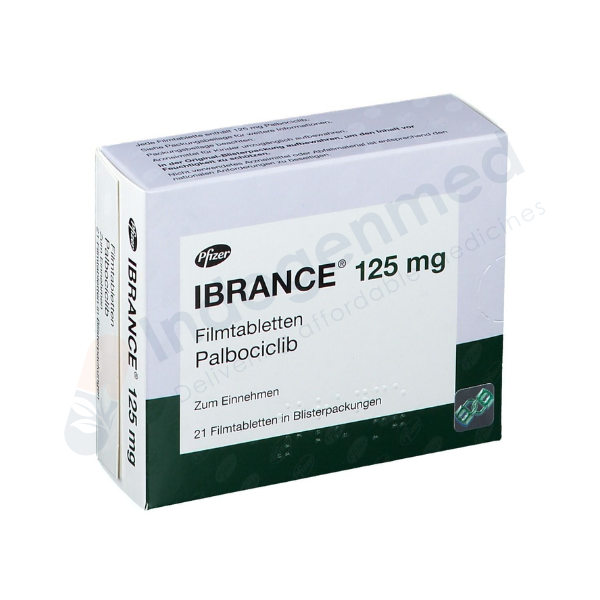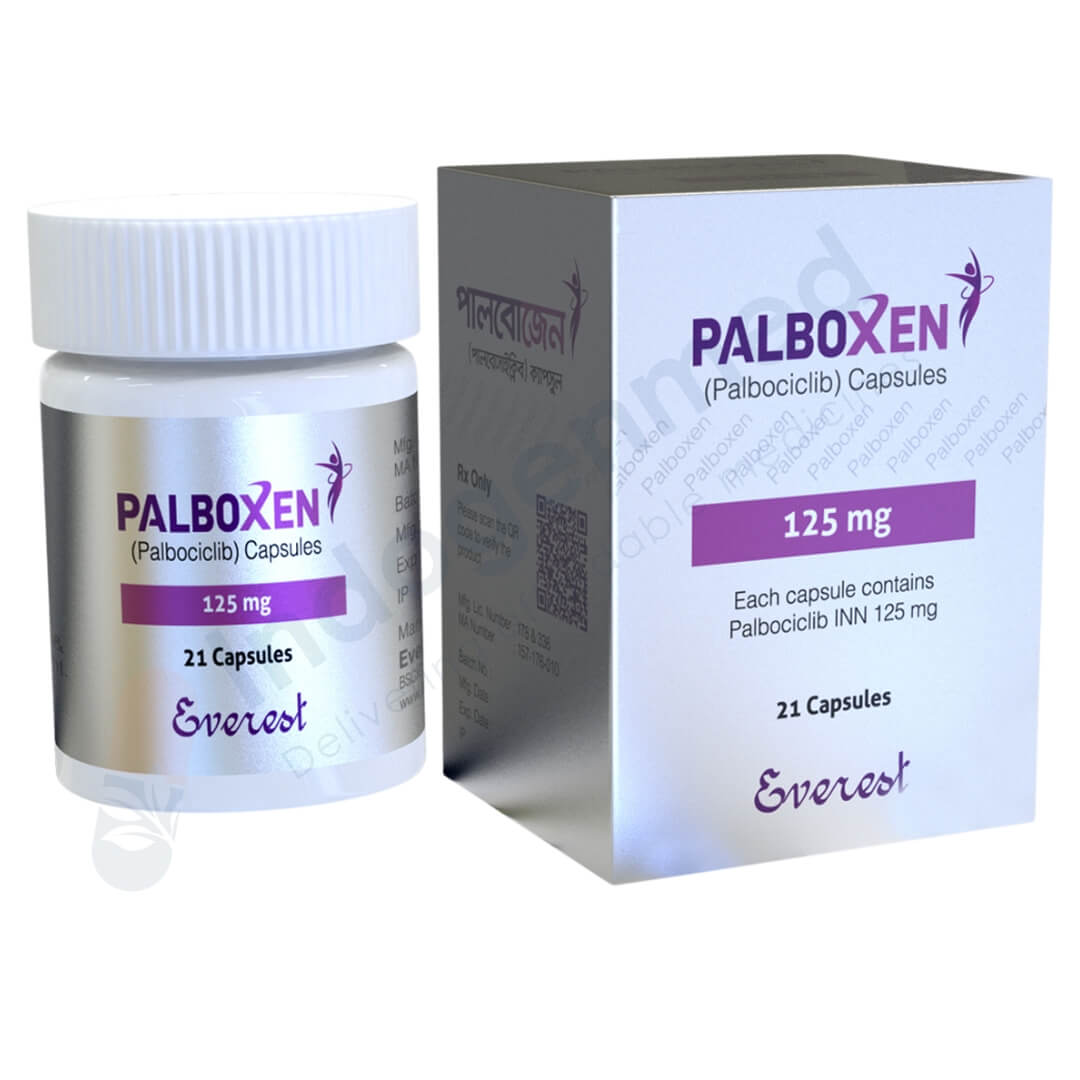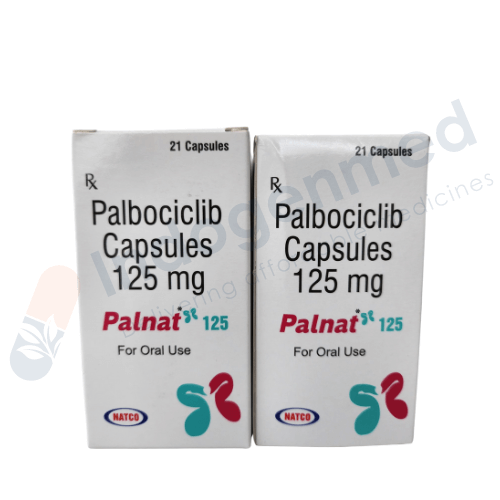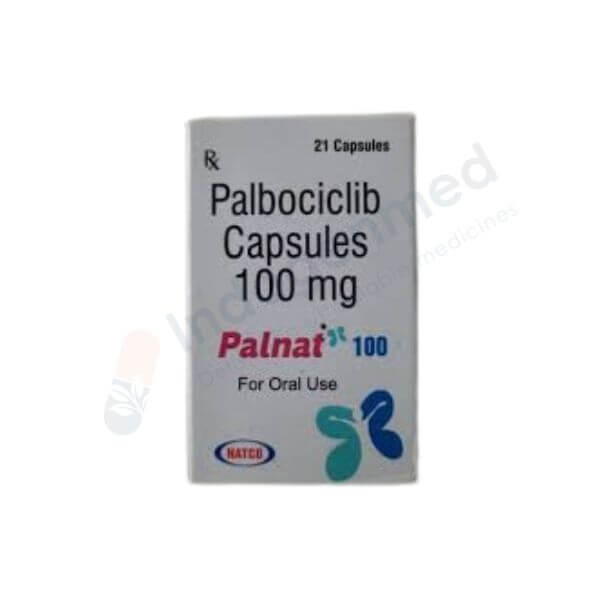AVAILABLE MEDICINE FOR Search By Molecule
| Image | Name | Price | Action |
|---|---|---|---|

|
Ibrance Palbociclib 125mg Tablets
|
|
Ask for Price |

|
Palboxen 125mg Capsules
|
|
Ask for Price |

|
Palnat 125mg Capsule
$170.00 $180.00 |
$170.00 $180.00 |
|

|
Palnat Palbociclib 100mg Capsules
$140.00 $150.00 |
$140.00 $150.00 |
Ask for Price |
Palbociclib is an oral medication used in the treatment of a specific type of breast cancer known as hormone receptor-positive (HR+), HER2-negative breast cancer. It belongs to a group of drugs called "CDK4/6 inhibitors" and is often prescribed for adults with advanced or metastatic breast cancer, meaning the cancer has spread to other parts of the body. Palbociclib is commonly taken with other hormone therapies to make the treatment more effective.
Hormone receptor-positive (HR+) breast cancer cells rely on hormones like estrogen to grow. Palbociclib is designed to work particularly well for this kind of cancer, especially when the HER2 protein is absent (HER2-negative). By targeting and inhibiting the growth of cancer cells, Palbociclib helps slow or stop the spread of these cells, offering hope to patients managing their condition.
How Palbociclib Works?
Palbociclib inhibits cyclin-dependent kinases (CDKs) 4 and 6, which are essential for cell division and growth. In cases of hormone receptor-positive (HR), HER2-negative breast cancer, these proteins become excessively active, leading to uncontrolled proliferation of cancer cells. By inhibiting CDK4 and CDK6, Palbociclib effectively reduces the capacity of these cells to divide and grow. This action helps slow cancer progression and limit the dissemination of cancerous cells. It is typically administered alongside hormone therapies such as letrozole or fulvestrant, which target estrogen receptors, thereby improving its overall effectiveness. This synergistic strategy makes Palbociclib particularly potent in managing advanced or metastatic breast cancer by targeting the disease from multiple fronts, resulting in improved disease control.
Two critical proteins, CDK4 and CDK6 (cyclin-dependent kinases 4 and 6), play a crucial role in controlling the cell cycle, especially during the G1 phase. When activated, these proteins allow cells to progress from the G1 phase to the S phase, enabling DNA replication and cell division. Targeting CDK4/6, Palbociclib works by specifically inhibiting (blocking) CDK4 and CDK6 proteins. By doing so, it stops the cancer cells from progressing through the cell cycle from the G1 phase to the S phase. When CDK4/6 is blocked, cancer cells are unable to replicate their DNA and divide, leading to a “cell cycle arrest.”
Why Is This Important?
By targeting CDK4/6, Palbociclib effectively slows or stops the growth of breast cancer cells, helping prevent the cancer from spreading. This targeted action makes Palbociclib a valuable treatment option for patients with advanced HR+, HER2- breast cancer, offering them a more focused approach compared to traditional chemotherapy.
Combination Therapy with Other Treatments
Palbociclib is typically not used alone; it’s combined with other therapies to enhance efficacy. Here’s how it pairs with common hormone treatments:
Palbociclib + Letrozole (or other aromatase inhibitors) : This combination is intended for women who have not yet undergone hormone therapy for advanced breast cancer. Letrozole inhibits estrogen production, which is essential for tumor growth; when paired with Palbociclib, it enhances treatment effectiveness.
Palbociclib + Fulvestrant: This regimen targets women whose breast cancer has progressed despite prior hormone therapy. Fulvestrant blocks estrogen's action on tumor cells; combining it with Palbociclib provides additional defense against tumor proliferation.
Benefits of Using Palbociclib
The primary benefits include:
- Slowing Disease Progression: It helps maintain stability in patients’ conditions by delaying tumor growth and spread.
- Enhancing Hormone Therapy Response: When used alongside hormonal therapies, its presence enhances overall treatment effectiveness.
- Convenient Administration: As an oral medication available in capsule or tablet form, patients can manage their treatment at home rather than requiring IV administration.
- Potential Quality-of-Life Improvements: By slowing disease progression, patients may experience fewer symptoms and be able to maintain daily activities longer.
Common Side Effects
Like any medication, Palbociclib may lead to side effects; however, not everyone will experience them. Common side effects include:
- Low White Blood Cell Count (Neutropenia): The most common side effect increases the risk of infection; regular blood tests are necessary.
- Fatigue: Many patients report increased tiredness; maintaining rest and a balanced diet can help.
- Nausea and Vomiting: Taking the medication with food may alleviate nausea.
- Hair Thinning: Some individuals may notice mild hair thinning, compared to the more severe loss associated with other treatments.
- Diarrhea: Staying hydrated while eating light meals can help mitigate this issue.
- Mouth Sores: Good oral hygiene practices and avoiding spicy or acidic foods can be beneficial.
These side effects tend to be manageable; physicians might adjust dosages or suggest supportive therapies as needed.
Precautions
When using Palbociclib, it is crucial to adhere to specific safety measures to enhance treatment effectiveness and ensure your well-being. Here are the main precautions to consider:
- Monitoring Blood Cells: Palbociclib can decrease levels of white blood cells, red blood cells, and platelets, increasing the risk of infections, anemia, or bleeding. Regular blood tests are necessary to monitor your blood cell counts throughout treatment.
- Infection Awareness: With a lower white blood cell count, you may be more vulnerable to infections. Be vigilant for symptoms such as fever, chills, sore throat, or other signs of disease, and inform your healthcare provider immediately if they occur.
- Pregnancy Prevention: The use of Palbociclib can be harmful during pregnancy; therefore, women who can conceive should utilize effective contraception during treatment and for at least three weeks following their last dose. Men with female partners in this category should also practice contraception during treatment and for a minimum of three months after the final dose.
- Breastfeeding Caution: Nursing mothers should refrain from breastfeeding while on Palbociclib and for at least three weeks post-treatment due to uncertainty about whether the drug enters breast milk and could affect a nursing infant.
- Avoiding Drug Interactions: Palbociclib may interact with various medications, including antibiotics, antifungals, seizure medications, and herbal products such as St. John's Wort. Always disclose all medications, supplements, and vitamins you are taking to your doctor to prevent adverse interactions.
- Liver Function Monitoring: Since Palbociclib might impact liver health, your physician may conduct liver function tests during treatment. Notify them if you experience any symptoms such as jaundice (yellowing skin or eyes), dark urine, or extreme fatigue.
FDA Approval
FDA Approval of Palbociclib (brand name Ibrance) was granted by the U.S. Food and Drug Administration (FDA) in February 2015. The approval was specifically for the treatment of hormone receptor-positive (HR+), human epidermal growth factor receptor 2-negative (HER2-) advanced or metastatic breast cancer.
Key Points About FDA Approval:-
Initial Approval (2015):- Palbociclib was approved for use in combination with letrozole as an initial endocrine-based therapy for postmenopausal women with advanced or metastatic HR+, HER2- breast cancer.
Expanded Approval (2016):- The FDA expanded the approval to include palbociclib in combination with fulvestrant for women with HR+, HER2- advanced or metastatic breast cancer who had disease progression after endocrine therapy.
Approval Based on Clinical Trials: The FDA approvals were based on the results of clinical trials, including PALOMA-1, PALOMA-2, and PALOMA-3, which demonstrated that palbociclib significantly prolonged progression-free survival (PFS) in patients with this type of breast cancer.


